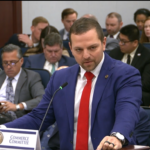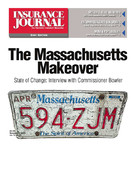Lenient parents best beware: A new generation of tough laws make parents liable for underage drinking.
In the past decade, about 35 states have passed “social host” laws that make adults criminally and civilly liable when they provide alcohol to minor guests who then cause a death or injury.
Fifteen of those states–Florida, Kansas, Maine, Maryland, Massachusetts, Minnesota, New Hampshire, New Jersey, Ohio, Oklahoma, Oregon, Pennsylvania, Rhode Island, Vermont and Virginia–go even further, holding adults accountable when they fail to halt underage drinking in their homes. Local police departments, county sheriffs and district courts are going after parents all over the country, sometimes with federal dollars.
Joining a trend toward stiffer legislation, activists in Connecticut, Nebraska and Ohio are lobbying their lawmakers to begin penalizing parents when minors are caught drinking.
“The new laws are critical,” said Penny Wells, executive director of Students Against Destructive Decisions (SADD), a national organization based in Marlborough, Mass., that advocates healthy choices for teens. “When parents promote something illegal, it sends the message to kids that it’s okay to break the law.”
Children and adolescents use alcohol more than any other drug, according to a National Institute on Alcohol Abuse and Alcoholism (NIAAA) study. Seven thousand youths died from alcohol-related injuries last year.
The NIAAA also found that parents’ attitudes toward alcohol influence their children’s drinking habits.
The drinking age is 21 in each of the 50 states and the District of Columbia. All states prohibit adults from purchasing alcohol for minors or furnishing it to them, though most make exceptions for children partaking in religious ceremonies and those given alcohol in non-intoxicating amounts by parents in private homes.
When it comes to underage drinking parties, many counties, cities and towns adopted zero-tolerance policies for youth possession and consumption years ago. Social host laws widen the scope of enforcement to make parents responsible when they allow minors to possess or consume alcohol.
An adult can face probation, steep fines and jail time and can be sued for damages caused by minors who drank under the adult’s supervision.
“It wasn’t so long ago that police just poured beer out,” Wells said. “But they can track a lot of violence, drunken driving, sexual assault and other crimes back to underage drinking.”
In states with social host laws, enforcement officials have been particularly vigilant during graduation, prom and homecoming seasons, times when underage drinking parties tend to flourish.
Federal block grants
In addition to state and local police spending, money for these heightened efforts also comes from the federal government in the form of Enforcing Underage Drinking Laws (EUDL) grants. The EUDL program–the only national initiative that targets underage drinking–has allocated block grants of approximately $360,000 each year since 1998 to each of the 50 states and the District of Columbia. EUDL money is flexibly distributed to agencies according to governors’ preferences, allowing states to tailor their approaches to varying demographics.
States are using many strategies, including:
The increased enforcement has caused legal headaches for some. Adults have been charged in Georgia, Iowa, Kansas, Montana, New Hampshire, Oklahoma, Rhode Island and Virginia. A handful have been convicted, fined and put on probation.
Among Wells and others in the field, the sense is that state laws are headed for even stricter territory because of increased funding from the federal government and heightened awareness of drinking’s dangers.
A bill that would make it illegal for an adult to permit any minor to drink alcohol was debated in the Rhode Island Legislature this spring but died. Nebraska’s Project Extra Mile, an advocacy group, is pushing for introduction of a tough social host bill in January 2005.
Diane Riibe, executive director of the Nebraska group, has often heard protestations that children will drink regardless of consequences.
“There’s always that opposition,” she said. “But I don’t think we will ever get to an appropriate level of accountability. It’s an illegal drug.”
Robyn Vanover, organizer of the “Parents Who Host Lose The Most” media campaign in Martin County, Fla., said that many parents themselves hope for harsher social hosting laws. “No one has expressed opposition,” she said. “The parents who do are just not informed.”
McConnell is a writer for www.stateline.org.
Was this article valuable?
Here are more articles you may enjoy.


 Cuts to Funding Mean Risks Will Pivot in Human Services Market
Cuts to Funding Mean Risks Will Pivot in Human Services Market  Ford Recalling 4.3 Million US Vehicles Over Software Issue
Ford Recalling 4.3 Million US Vehicles Over Software Issue  Deep Freeze and Drought Fueled a Massive Florida Wildfire
Deep Freeze and Drought Fueled a Massive Florida Wildfire  Florida OIR Slams Committee-Approved Clearinghouse Bill Changes as ‘Illusory’
Florida OIR Slams Committee-Approved Clearinghouse Bill Changes as ‘Illusory’ 


